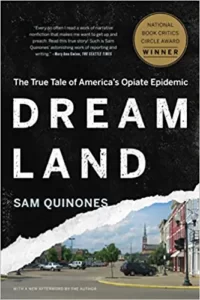Weed Not the Bonanza Supporters Envisioned
Back in October of 2015 Sam Quinones spoke at the Marshall University student center, an event that drew a packed house.
It was six months after the release of Dreamland, the author’s chronicling of the opioid epidemic in Middle America that still plagues this part of the nation.
Most audience members were familiar with the source of his book’s title: the swimming pool in nearby Portsmouth, Ohio. Long since plowed under, that city’s long-time community gathering spot is now home to a Walmart.
That was one of many points Quinones made that night: as a nation, we are losing the centers of community activity that used to help draw us together.
Divided by numerous social and economic factors—and now political enmity—we too often resort to self-centered entertainment and other diversions.
Costly Legalization of Weed
During the question-and-answer session that followed, I went to the microphone, first to thank him for the painstaking research that had shone a spotlight on this crisis.
I also posed a question about the former Los Angeles Times reporter’s views on the legalization of marijuana. I wanted to know if he thought it would create the financial bonanza supporters ballyhooed.
In a word: no. Quinones talked about how the tax revenue derived from the sales of legal marijuana had to be devoted to enforcement. That includes licensing, inspection, policing and a host of other administrative details.
To sum it up, he said that income associated with taxing sales of weed would be gobbled up by the costs of overseeing it. Which means that we’re playing a zero sum game for the sake of some people enjoying a legal high.
Prophetic Comments
Quinones’s talk proved prophetic, according to a recent story in Time magazine headlined, “The Economics of Legal Weed Don’t Work.”
Writer Belinda Luscombe noted that 10 years ago Colorado became the first state to fully legalize the recreational use of marijuana. Following in their footsteps were numerous others, to the point that an estimated 40% of American adults can legally buy cannabis.
But it hasn’t brought the financial windfall supporters had predicted, say economists Daniel Sumner and Robin Goldstein. They are the authors of the July release, Can Legal Weed Win? The Blunt Realities of Cannabis Economics.
Luscombe launched a Q&A with the authors by asking how business is going now that a growing minority of people can buy grass legally.
Sumner replied, “It’s been tough. There’s still a whole lot of illegal weed out there available to that same group of consumers, and most of them choose the illegal product because it’s half the price.”
Regulatory Maze

His prime example is Vermont, which legalized recreational marijuana in 2018 and has yet to issue any licenses. Can you say, “Government bureaucracy”?
Then there’s the enforcement dilemma posed when trying to make legal weed less regulated while cracking down on illegal sales.
Goldstein observed that voters intending to relax legal punishment for marijuana use can butt heads with the need to restrict illegal dealers, who have an 80-year history of producing and selling it.
“This pre-existing illegal market is so robust that to come in and try to bust that up, it’s a logistical nightmare for law enforcement,” he said.
As Sam Quinones commented years ago, legal marijuana is a wash when it comes to tax benefits. I would argue that, overall, weed’s negative impacts have made things worse.



